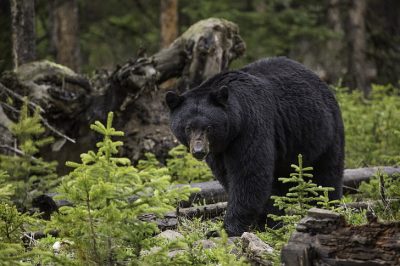People might be hibernating during the pandemic, but local bears haven’t been staying at home.

Massachusetts residents have spotted more black bears than usual recently as more people spend time indoors during the pandemic.
The bear population in Massachusetts has increased over the past 50 years, with the majority in western and central Massachusetts, but bears are also moving into the suburbs of Boston.
MassWildlife’s Black Bear and Furbearer Project Leader Dave Wattles said with the pandemic shutting down dense metropolises since March, people who have been venturing outdoors more often also have more opportunities for chance bear encounters.
“You may have a situation this year where because people are home, they’re outside a lot,” Wattles said. “Particularly when COVID was first ramping up, there may have been a lot of encounters that people had with bears when they normally would be at work or school.”
Rachel Lovejoy, a student research assistant at Amherst College who works on the MassBears and Mammals of the Pioneer Valley projects, said with fewer people and cars on the roads, more bears could venture out into the open.
“There might be more bears willing to come out of the woods more often,” Lovejoy said. “But, it is surprising given that we’re getting a little closer into hibernation season where you would expect them to not see as many.”
Because bears are motivated by food, Wattles said people who live near bears should remove food sources from their yards.
“Bird feeders are a terrible thing to have in bear country,” Wattles said. “It basically is an easy meal that a bear can take advantage of every single time.”
Installing an electric fence around yards can also prevent bears from habitually returning to a house for food, Wattles said.
“We’re strongly encouraging people to use electric fencing,” Wattles said, “so that bears don’t kill their chickens or damage their hives, but also to protect the bears from themselves so that they don’t develop bad behaviors.”
Rob Halpin, director of communications and public relations at the Massachusetts Society for the Prevention of Cruelty to Animals – Angell Animal Medical Center, said anyone who encounters a bear should wave their arms and make noise while staying calm.
“Usually wild animals don’t want to come into contact with us any more than we want to come in contact with them,” Halpin said. “They’re just looking for food, so if we eliminate that food source, they’ll be on their way.”
Bears need food for hibernation, and with the winter months coming up, the bears are out looking for something to eat, Wattles said.
“They’re driven by food. They’re never going to change,” Wattles said. “So, we as a society need to learn how to behave and how to live with their surroundings.”



















































































































